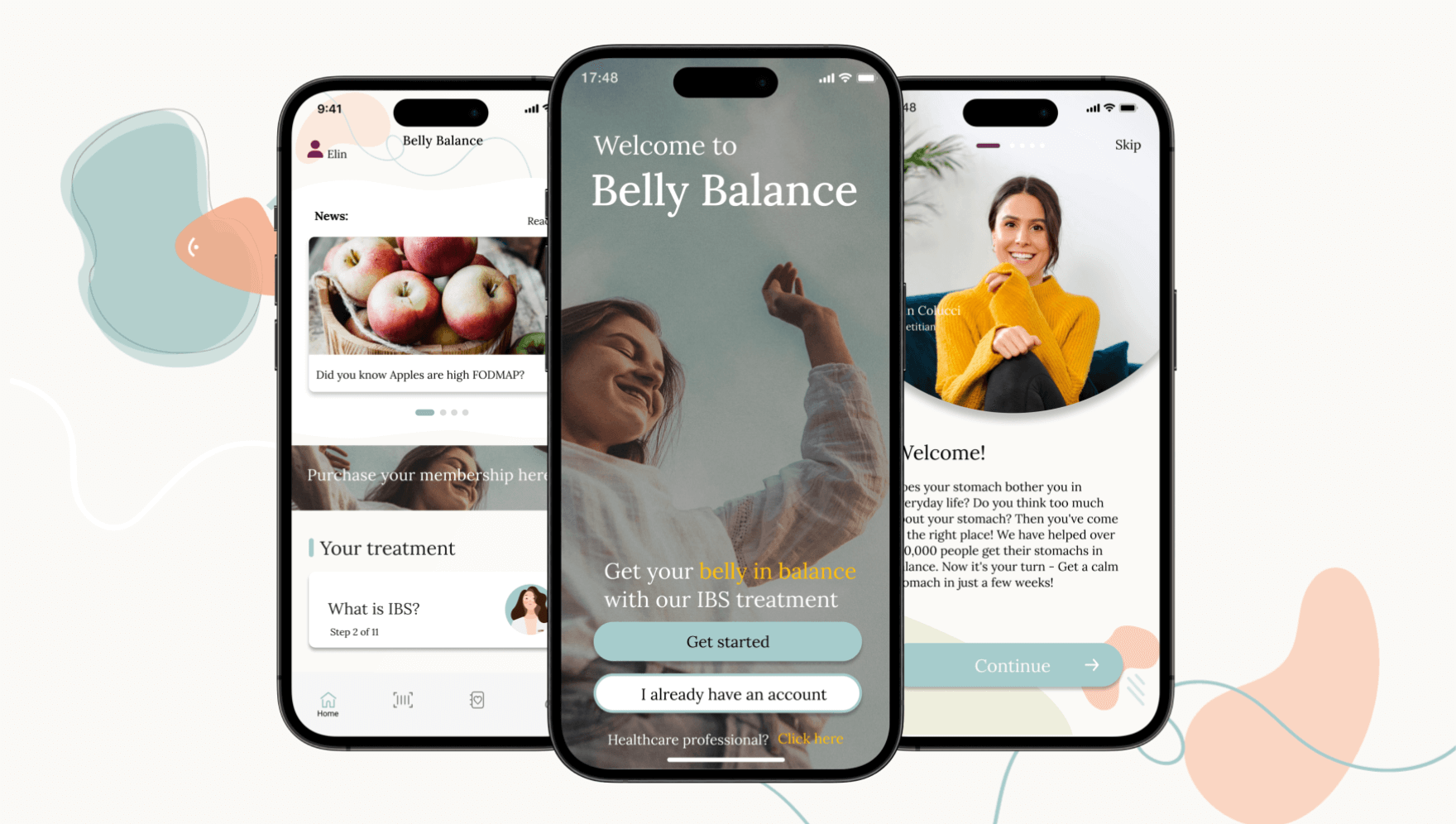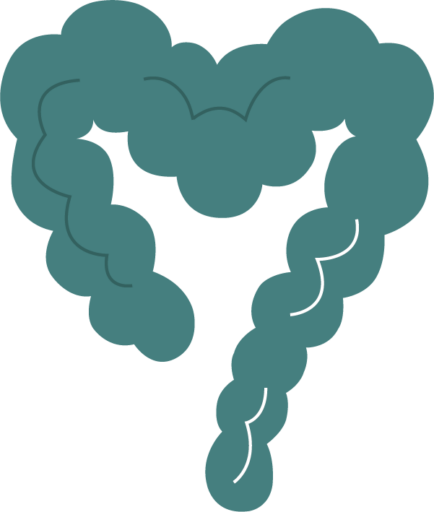
IBS – symptoms, cause, and treatment
Stress stomach, bloated stomach, lactose stomach – IBS, or Irritable Bowel Syndrome, is a functional gastrointestinal disorder, meaning no physical abnormalities are found in the stomach or intestines, but they simply don’t function as they should. About 15-20% of the world’s population has IBS, and the majority of those seeking treatment are women aged 20-65. Among men, there is a significant underreporting, partly because fewer men seek medical care. The number of children and young people diagnosed is also increasing. It has long been known that psychological factors play a role in IBS, and that anxiety and stress can worsen the condition.
Research on IBS is ongoing, both in terms of causes and treatments. Previously, dietary advice for IBS patients was often general, as specific dietary guidelines were lacking. Adjusting fiber intake, eliminating lactose, or, in the worst case, receiving no advice at all, was common. Today, we know better, and the FODMAP diet now helps the majority of patients. At Belly Balance, we keep up with research, and when new evidence is presented, we adapt or develop our treatments accordingly.
Causes of IBS
The causes of IBS are still not fully understood. The hereditary factor is around 20-50%. Additionally, there are several theories that include disturbances in intestinal motility, defective gas transport, a thin filter in the nervous system between the gut and the brain, changes in gut flora (prebiotics serve as food for gut bacteria), and low-grade inflammation in the intestinal lining.
Most people report either having had stomach issues for as long as they can remember, being diagnosed around the age of 20, after a stomach infection or illness, or following a period of prolonged stress or trauma. Many also find that stress and anxiety worsen their symptoms, which has led to the belief that the condition was purely psychosomatic. What we know now is that multiple factors work together, and that diet and stress play a crucial role.
Researchers are increasingly focusing on the role of gut bacteria in the development of IBS. There is ongoing research into probiotic supplements and their potential to reduce IBS symptoms.
Take control of your IBS today!
Ready to reclaim your life from IBS? Our app provides the tools and guidance you need to manage IBS effectively.
Download the AppIBS symptoms
Symptoms vary from person to person but almost always include some of the following:
- Bloating (usually worsens throughout the day)
- Gas
- Constipation
- Diarrhoea
- Alternating constipation and diarrhea
- Incomplete bowel movement (feeling like you’re not done after using the toilet)
- Cramps, flare-ups, or abdominal pain
- Rumbling (sounds from the stomach)
If you experience any of these symptoms, you should see a doctor for an evaluation. Afterward, you can try the FODMAP dietary treatment.
The diagnosis of IBS
There are criteria for the diagnosis of IBS, and it is common for a doctor to make the diagnosis after testing for lactose and gluten. Additionally, doctors may sometimes perform endoscopic examinations of the intestines (gastroscopy or colonoscopy). You can also be tested for lactose intolerance through a blood test or a so-called load test. The blood test is more common today, but it only indicates whether you have the genotype for developing lactose intolerance at some point and is therefore not completely reliable.
There are three types of IBS: IBS-D (diarrhea-dominant), IBS-C (constipation-dominant), and IBS-M (mixed bowel habits). The definition of constipation is fewer than three bowel movements per week, and diarrhea is more than three loose stools per day.
Some doctors diagnose without any tests. However, it is important to rule out inflammatory bowel diseases such as Crohn’s disease and ulcerative colitis. A colonoscopy is especially important for those with alarm symptoms such as fever, blood in the stool, and unintentional weight loss, as these are not typical IBS symptoms. A doctor should further investigate these symptoms. You do not need to have received a diagnosis before trying the FODMAP treatment.
Note! We always recommend a gluten test before starting a FODMAP treatment. Since the intake of grains decreases with a FODMAP diet, antibodies against gluten may disappear, making the test unreliable.
Treatment of IBS
Swedish healthcare long lacked standardized treatment. For the past few years, the FODMAP dietary treatment has been implemented in Swedish healthcare by Sofia Antonsson, a registered dietitian and the founder of Belly Balance. According to scientific studies, the FODMAP dietary treatment helps 75% of all individuals with IBS reduce their symptoms. In recent years, we have successfully treated thousands of people using FODMAP. You can find the dietary treatment in the Belly Balance app, where we combine it with mindfulness, breathing exercises, and stress management. For the best results, it is important to follow the treatment correctly, either with the help of a dietitian or through the app.
Belly Balance is currently a leader in Sweden in treating IBS with the FODMAP dietary treatment. Here, you can find information about treatment, recipes, news, and current research.
In addition to dietary treatment, there are alternative therapies such as hypnosis, cognitive-behavioral therapy (CBT), and medication, which are tried to varying degrees. Studies show moderate effects from available medications, and some people find that the effectiveness of these products diminishes after a period of use. This may be due to the placebo effect, which is high with gastrointestinal medications, resulting in an initial effect that fades after a few weeks. Currently, the FODMAP dietary treatment is the most effective treatment available.
Myths about IBS
There are many myths about IBS that we hear from the people we meet. “It’s all in your head,” “eat less fiber,” and “avoid gluten” are common myths. There are more, and unfortunately, they usually do more harm than good. As we know, there are no quick fixes, but there are solutions that we know work. For us, the most important thing is that you experience a reduction in your symptoms and that they become less bothersome, and that’s the knowledge we share in our treatment.
Frequently Asked Questions about IBS
What tests does the doctor perform before diagnosis?
It varies a bit. Some doctors diagnose without any testing, but it is recommended to conduct tests for lactose and gluten to rule out intolerances.
My doctor wants to give me medication; is there anything that helps with IBS?
Currently, there are only medications that can improve certain symptoms, but there are no drugs that address the entire symptom profile. The medications available today can only improve specific symptoms and are not particularly effective, helping only a small portion of patients. Dietary treatment with FODMAP helps 75% of all individuals with IBS and is the most effective method. Therefore, we recommend starting with dietary treatment and then possibly trying medication if symptoms persist.
I’ve had stomach issues my entire life; can it really be IBS?
Yes, many people receive the diagnosis later in life after prolonged digestive issues. However, it is never too late to do something about it!
How does candy fit in with IBS?
Regular sugar, both sucrose and granulated sugar, is not a FODMAP because it consists of 50% glucose and 50% fructose. Candy, or rather sugar, and IBS often do not mix well. Don’t despair; there are candies and snacks that work well if you have IBS.
"Belly Balance digital treatment"
In the Belly Balance app, you can log symptoms, keep a food diary, scan products, find FODMAP lists, and much more to help you manage your IBS.
Sofia Antonsson
Reg. Dietitian, Belly Balance
Read more about

IBS - What is it?
Bloated , constipated or having a gassy stomach? IBS or Irritable Bowel Syndrome is a functional gastrointestinal disorder, meaning no physical issues can be found in the stomach or intestines; they just don’t function quite as they should.

How the app works
Download the app and become part of our community. We assist you in achieving a calm and happy stomach through treatment and tools available directly in the app.

About FODMAP
By learning which foods upset your stomach, you can make conscious choices and get quick symptom relief. With the low FODMAP diet, you receive structured assistance in understanding which foods your body tolerates better than others. No more guessing and pondering – you get the answer straight away!

